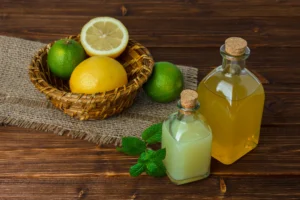Many cuisines, notably those of the Mediterranean and Levant, use lemon juice and olive oil as staple components.
Combining olive oil and lemon juice is said to treat a number of ailments, including gallstones, joint discomfort, and early aging.
We’ll talk about whether research exists to support the purported health benefits of combining lemon juice and olive oil in this post. Additionally, we will go over the advantages and possible drawbacks of each of these components separately.
Olive oil benefits
Olive oil is made by pressing the oil from ripe olive fruits using a centrifuge or pressure cooker, among other techniques. Many people consider extra-virgin olive oil (EVOO) to be the best kind of olive oil.
Oleic acid, a monounsaturated fatty acid (MUFA) that is good for the heart, makes up about 73% of EVOO. It also contains large amounts of vitamins K and E.
The high concentration of naturally occurring substances known as polyphenols in olive oil is another alluring feature. These potent antioxidants eliminate dangerous substances known as free radicals from your body, shielding you from oxidative stress.
Lemon juice benefits
You obtain lemon juice by pressing lemons. The Rutaceae family of plants includes the citrus fruit known as lemon, which is native to the Mediterranean region.
Antioxidants, particularly vitamin C, are abundant in lemon juice. Flavonoids, another compound found in lemons, are potent anti-inflammatory and antioxidant agents.
Claims about the combination
Some individuals say that eating lemon juice and olive oil together has health benefits. Individuals assert that they can aid in weight loss, treat and prevent gallstones, and perform cleanses and detoxes.
Let’s look at each of these assertions separately.

Cleanse and detox claims
You can discover a variety of recipes online that claim to use lemon juice, olive oil, or both to detoxify and cleanse your body.
The idea behind cleanses and detoxes is to remove waste and toxins that have accumulated in your body over time.
If lemon juice and olive oil can aid in cleansing or detoxification. There don’t seem to be many studies on the subject.
A 2018 review of 27 high-quality studies examined how eating olive oil affects health compared to other plant oils.
The study’s findings showed that, in comparison to those who ingested other plant oils, those who consumed olive oil had lower blood levels of LDL (bad) cholesterol and higher blood levels of HDL (good) cholesterol.
We looked for high-quality research, but found none that showed olive oil consumption helps digestive problems.
On the other hand, we could refer to the antioxidants and polyphenols in olive oil and lemon juice. As “cleansing” because they “clean up” or neutralize dangerous free radicals. Which otherwise damage cells and may contribute to illness and disease.
In order to eliminate toxins and preserve peak performance, the
I advocate consuming a varied diet rich in fruits, vegetables, whole grains, legumes, nuts, seeds, and lean sources of protein to help your body perform at its optimum.
Weight loss claims
Research has linked certain elements of lemon juice and olive oil, such as the MUFAs in olive oil and the vitamin C in lemon juice, to weight management. Vitamin C content in lemon juice is high. The amount of 38.7 mg in a 3-ounce (100-gram) meal corresponds to 43% of the Recommended Dietary Allowance (RDA) for males and 52% of the RDA for women.
The synthesis of carnitine in the human body depends critically on vitamin C.
One substance that helps get fat molecules into the cells. The body breaks down carnitine and uses it as fuel, which is the function of this compound. Consequently, a lower rate of fat breakdown may result from a low vitamin C intake.
An earlier study from 2006 found that when healthy persons walked on a treadmill for 60 minutes. Those with moderately low vitamin C burnt 25% less fat than those with enough vitamin C.
In another study, researchers administered ascorbic acid (vitamin C) to obesity-prone mice and fed them a high-fat diet for 15 weeks. Compared to mice fed a high-fat diet without vitamin C. The mice with vitamin C supplementation developed less body fat and showed other signs of improved health.
Studies that look at the impact of drinking a combination of lemon juice and olive oil on weight don’t seem to exist. When integrated, though, the separate elements might still work well.
It’s crucial to remember that researchers need to conduct more recent studies with humans.
Kidney stones and gallstones claims
The foods you eat can significantly influence kidney and gallstone formation. Research recognizes that consuming high amounts of saturated fats and taking in low levels of vitamin C are associated with these disorders. The gallbladder forms gallstones, which are hardened deposits of cholesterol and digestive juices. You could or might not have symptoms, depending on the size and location of the gallstones.
Some sources claim that a folk cure for gallstones involves combining lemon juice and olive oil to encourage the stones to move. Nevertheless, no study exists to support this assertion.
You can avoid gallstones by following a number of healthy eating recommendations, including consuming fats like olive oil.
By regularly contracting and emptying the gallbladder, ingesting healthy fats like olive oil may help avoid gallstones, according to some research.
Gallstone development has also been associated with a vitamin C deficit. By turning cholesterol into bile acids, vitamin C may block the crystallization of cholesterol and prevent the formation of gallstones.
A sizable but older study from 2000 showed that every 27 micromol/L rise in ascorbic acid (vitamin C) in the blood reduced gallstone development in women aged 20 to 74 by 13%. However, researchers need to conduct more studies because the available data is limited and outdated.

Are they a super duo?
Lemon juice and olive oil contain numerous elements that may be beneficial to your health. Every component offers potent health advantages of its own.
Could we consider olive oil and lemon juice a super pair that provides more potent benefits when combined than when consumed separately? Essentially, the answer is no.
This mixture is supposed to treat gallstones, reduce joint pain, enhance digestion, and detoxify the body. None of the trials, nevertheless, indicate that combining them produces stronger results.
Potential downsides
There are no negative effects from mixing lemon juice and olive oil, according to research or case studies. Nevertheless, despite what some anecdotal sources suggest, it is not a good idea to anticipate the mixture to heal sickness.
Although using lemon juice and olive oil together doesn’t have any specific documented drawbacks, each of these ingredients has a few small drawbacks.
Olive oil with lemons can, like many meals, create an allergic reaction in a tiny percentage of people.
If you often eat acidic foods like lemon juice, it can potentially damage your tooth enamel.
Additionally, keep in mind how high in calories olive oil is. There are 119 calories in one tablespoon (13.5 grams) of olive oil. Therefore, you should consume olive oil in moderation if you’re trying to cut calories for weight loss or other reasons. Consult a medical practitioner if you have an illness and are unsure of the therapies that might be effective for you.

1 thought on “Olive oil and lemon Benefits”